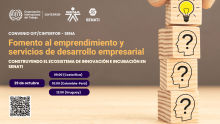SENATI shares its roadmap for building an innovation and incubation ecosystem
With the participation of more than one hundred people from Latin America and the Caribbean, Cinterfor concluded the first cycle of webinars on entrepreneurship promotion and enterprise development services, held within the framework of the 2025 Cooperation Agreement between the ILO/Cinterfor and Colombia’s SENA. The final session focused on the experience of Peru’s National Training Service for Industrial Work (SENATI) and was presented by Karen Mandujano and Gianina Gianoli, with the support of SENATI’s Development Manager, Carlos Hernández.
Highlights
A national technical institution. SENATI has a 64-year trajectory, a decentralized presence across the country and a community of more than 137,000 students (over 150,000 in the most recent edition of the competition). It employs more than 5,000 instructors, operates around 1,000 laboratories, and offers 76 programmes across 13 occupational families. Women represent approximately 30 per cent of the student body.
Partnerships driving innovation. SENATI maintains more than 120 cooperation agreements with enterprises, universities, and national and international organizations. Thanks to these partnerships, Centres of Excellence have been established (for example, with Bosch, Komatsu and Siemens), enabling state-of-the-art training without requiring direct institutional investment.
“SENATI Innova” competition. This is the main instrument for energizing the innovation ecosystem, focusing on prototypes developed by instructors and students. Its thematic areas are: Transformative patents, Technology for technical education and Transformation in industry and enterprise. The most recent edition saw the highest level of partner engagement (25) and mentoring collaborations with seven universities. The latest winners came from regions such as Cusco (the previous year, Junín), reflecting the decentralization of innovation efforts.
From the classroom to enterprises and territories. Dual training and SENATI’s regional presence make it possible to identify real problems and turn them into innovation challenges. To promote inclusion and sustainability, the competition awards incentives to projects aligned with the SDGs, women’s participation and environmental components.
Towards institutionalization: incubator and intellectual property. SENATI is advancing the creation of a start-up incubator with a circular economy focus, supported by international cooperation (e.g. European programmes such as Erasmus) and business partnerships. In the field of patents, it works with INDECOPI and is in the process of joining the CATI network to strengthen institutional capacities.
Research and publications. The Development Management Office promotes the conversion of prototypes into research papers and provides training for instructors and students in academic tools such as Turnitin, research methodology and citation practices.
Specialized technological services. In addition to training, SENATI offers services such as the Textiles and Garment Technology Centre, winner of a Prociencia fund of nearly US$100,000, which conducts laboratory testing, innovation activities and consulting for export-oriented SMEs.
Competitions and international projection. The institution participates in WorldSkills Americas and organises national olympiads under equivalent standards to select and prepare its representatives.
Among the main lessons and next steps identified by SENATI, the role of partnerships stands out as the backbone of the innovation ecosystem, where enterprises, academia and the State co-design challenges, evaluate projects and promote the establishment of laboratories and centres of excellence. Decentralization is another key pillar, as the training offer is adapted to the productive needs of each region, allowing the results of “SENATI Innova” to reflect growing leadership beyond Lima. Continuous learning pathways are further strengthened through agreements with universities that facilitate credit recognition and continuation of studies, while university graduates find in TecSENATI an opportunity for practical upskilling using real industrial equipment. Innovation is embedded throughout technical training: each graduate must present an innovation plan or project, generating more than 10,000 initiatives annually among students and instructors. Finally, SENATI’s institutional challenge is to consolidate its entrepreneurship incubator, expand the network of laboratories open to industry, and strengthen intellectual property management, thereby building a sustainable and well-integrated ecosystem of technological and productive innovation.
At the close, Cinterfor expressed its appreciation to SENATI for sharing its experience and to all the institutions participating in the webinar cycle (INAH–Costa Rica and SENAI–Brazil in previous sessions). As announced at the outset, the recording and presentations from the webinar will be available on the Cinterfor website





